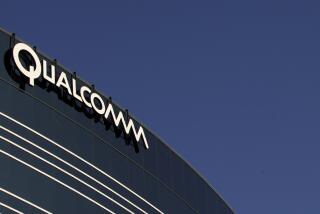Qualcomm’s image takes another hit
- Share via
A federal judge’s harsh rebuke of Qualcomm Inc. added to the legal woes of the San Diego-based wireless chip designer, which is rapidly gaining an unwanted reputation as a company that plays outside the rules.
U.S. District Judge Rudi M. Brewster in San Diego berated Qualcomm for orchestrating patent and litigation strategies that were rife with deception. He said hidden patent information, false testimony from employees and a failure to turn over important e-mails and other data showed that Qualcomm was “holding hostage the entire industry.”
Brewer had overseen one of several bruising patent disputes that Qualcomm lost to rival chip maker Broadcom Corp.
The judge’s ruling, released late Monday, further tarnished the image of Qualcomm, whose technology powers the networks of Verizon Wireless, Sprint Nextel Corp. and other carriers.
“These guys are getting a history of being thugs and bad guys,” said Jay Sandvos, a Boston patent lawyer following the case.
By its actions, Brewster said, Qualcomm had waived its rights to enforce two patents against Irvine-based Broadcom. He also ordered Qualcomm to pay Broadcom’s attorney fees and costs.
Qualcomm said it would appeal the court’s ruling.
In a statement, it acknowledged the “seriousness of the court’s findings” and reiterated an apology it made to the court in April “for the errors made during discovery and for the inaccurate testimony of certain of its witnesses.”
But it disagreed with the court’s conclusion that it was under any obligation to disclose its patents to an international committee that was setting technical standards for compressing digital video.
Broadcom said it would seek court orders requiring Qualcomm to disclose its misconduct in other business cases and requiring that a third party be appointed to monitor Qualcomm’s conduct in future litigation.
“This is the first case where we’ve been able to explore Qualcomm’s standards activities,” said David J. Rosmann, Broadcom’s vice president for intellectual property litigation. “We believe the company goes to extreme lengths to hide their activities.”
Brewster’s order followed a trial this year in a patent infringement case that Qualcomm had brought against Broadcom. A jury not only found in Broadcom’s favor, but it also cited Qualcomm for skulduggery in the process that resulted in a technology standard for compressing video digitally.
In his 54-page opinion, Brewster said that Qualcomm had a “plan to profit heavily” from its wrongdoing and that its misconduct before an industry standards-setting committee “suggests extremely sophisticated foul play.”
The company had failed to disclose that it already had patents covering the proposed video standards. Without warning, it sued Broadcom for later building chips to those standards.
At trial, Qualcomm’s witnesses testified falsely about the company’s participation in the standards process, Brewster said. One witness revealed in the final days of testimony the existence of crucial information that the company had never turned over to Broadcom, which it was required legally to do.
“The eventual collapse of Qualcomm’s concealment efforts exposes the carefully orchestrated plan and the deadly determination of Qualcomm to achieve its goal of holding hostage the entire industry,” Brewster wrote.
Analysts and legal experts said the judge’s bruising words gave Qualcomm black eyes at a time when it had no more eyes to blacken.
The chip maker is embroiled in patent and business lawsuits and investigations throughout the U.S. and abroad.
The White House on Monday refused to lift an order banning the import of handsets containing the latest high-speed Qualcomm chips. The ban stemmed from a case won by Broadcom before the U.S. International Trade Commission.
Broadcom also won a $19.6-million jury award against Qualcomm in a patent trial in Santa Ana and has other lawsuits pending against the company.
Qualcomm is involved in other U.S. business lawsuits, as well as investigations in Europe and South Korea on complaints brought by handset maker Nokia and chip makers, including Texas Instruments Inc., on allegations that it engaged in unfair business practices.
“They’ve been on a losing streak, and they’re definitely roughed up,” said analyst Mark McKechnie at American Technology Research in San Francisco.
The stakes are getting much higher now, he said, as the company pushes its products into new third-generation, or 3-G, networks and handsets capable of handling streaming video, e-mail and Web browsing.
Patent lawyer Lyle Vander Schaaf in Washington said Qualcomm’s position was further weakened when two carriers, including Verizon, went around the company to sign deals with Broadcom that allow them to import the infringing handsets.
“It doesn’t bode well for Qualcomm,” Vander Schaaf said.
Qualcomm shares fell $1.28 to $40.50. Broadcom stock dropped 68 cents to $32.76.
The message from Wall Street, McKechnie said, may well be that enough is enough and that Qualcomm, Broadcom and the others had better start settling cases soon.






